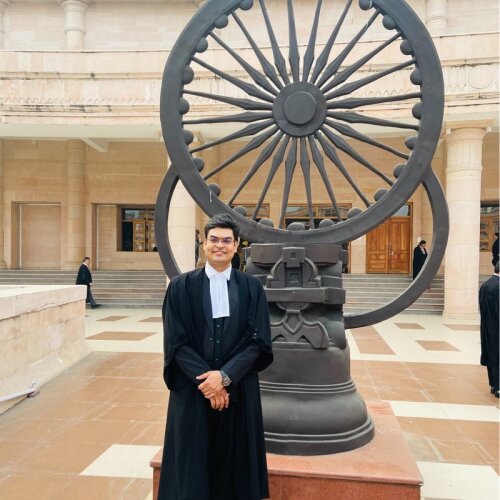Best Faith-Based Law Lawyers in Lucknow
Share your needs with us, get contacted by law firms.
Free. Takes 2 min.
List of the best lawyers in Lucknow, India
About Faith-Based Law in Lucknow, India
Faith-Based Law in Lucknow, India, primarily refers to legal systems and practices that are grounded in religious beliefs and principles. India is a diverse country with multiple religions, and laws applicable to different religious communities are collectively known as personal laws. In Lucknow, a city with a rich cultural and religious history, faith-based laws cover matters such as marriage, divorce, inheritance, adoption, and charitable activities conducted by religious institutions. Different religious communities, such as Hindus, Muslims, Christians, Sikhs, and others, follow personal laws based on their faiths, which coexist with the general laws of India.
Why You May Need a Lawyer
People may require legal assistance under Faith-Based Law in a number of scenarios, including:
- Issues related to marriage, including ceremonies, registration, and disputes.
- Divorce proceedings, which can vary significantly based on religious customs and regulations.
- Inheritance and succession disputes, particularly when religious principles dictate the distribution of assets.
- Seeking adoption or custody of children under religious guidelines.
- Establishing, governing, or managing religious trusts and charitable institutions.
- Resolving conflicts between religious practices and secular laws.
- Understanding the rights and duties prescribed under various personal laws.
Local Laws Overview
In Lucknow, as in the rest of India, personal laws are a significant part of the legal system. Key aspects of these laws include:
- Hindu Law: Governs marriage, divorce, and property succession for Hindus, Jains, Sikhs, and Buddhists.
- Muslim Law: Based on Sharia Law for matters like marriage, dower (mehr), divorce, and waqf (endowment).
- Christian Law: Includes provisions from the Indian Christian Marriage Act and the Divorce Act on marital issues.
- Parsi Law: Addresses Parsi marriage and divorce under the Parsi Marriage and Divorce Act.
- General Law: The Special Marriage Act allows for interfaith marriages and is applicable across India.
Frequently Asked Questions
What is Faith-Based Law?
Faith-Based Law refers to legal provisions and practices that are determined by religious beliefs and customs applicable to various communities.
Who do Faith-Based Laws apply to in Lucknow?
Faith-Based Laws apply to individuals belonging to specific religious communities such as Hindus, Muslims, Christians, Sikhs, Jains, and others, based on their respective personal laws.
Can I get married under secular laws in India?
Yes, the Special Marriage Act provides a secular alternative for marriage, allowing individuals of different religions to get married without changing their faiths.
How are divorce proceedings handled under Faith-Based Laws?
Divorce proceedings under Faith-Based Laws vary by religion, with each system outlining specific grounds and procedures for divorce relevant to its followers.
What are my rights in a faith-based marriage?
Your rights in a faith-based marriage depend on the personal laws of your religion, which define your rights and obligations within the marriage.
Can religious laws override secular laws in India?
Religious laws cannot override the Constitution of India and secular laws, especially when fundamental rights are at stake.
Is there a uniform civil code in India?
As of now, India does not have a uniform civil code, and different personal laws are applicable based on religious affiliations.
How are inheritance and succession handled in Faith-Based Laws?
Inheritance and succession are managed according to personal laws, with different rules for Hindus, Muslims, Christians, and Parsis, among others.
What role do religious institutions play under Faith-Based Laws?
Religious institutions can establish trusts, conduct marriages, and even mediate disputes in accordance with their faith's doctrines and legal statutes.
Where can I seek legal advice for Faith-Based Laws?
You can seek advice from legal practitioners specializing in personal and family laws specific to your religion, or contact religious legal authorities.
Additional Resources
The following resources can be helpful for individuals seeking advice on Faith-Based Law in Lucknow:
- District Court of Lucknow - Offers legal services and guidance on personal law matters.
- State Law Commission, Uttar Pradesh - Provides reports and recommendations on personal law reforms.
- Local Bar Associations - Connect with lawyers specialized in religious and personal laws.
- Religious Organizations - Many offer mediatory services and legal advice for faith-based issues.
Next Steps
If you need legal assistance in Faith-Based Law, consider the following steps:
- Identify the religious context of your legal issue and which personal laws apply.
- Seek out a lawyer in Lucknow with expertise in Faith-Based or personal laws corresponding to your faith.
- Contact local legal aid organizations and bar associations to find qualified legal practitioners.
- Consult with any government or non-governmental organizations related to your legal concerns.
- Prepare necessary documents and formulate clear questions or issues to discuss with your lawyer.
- Consider mediation through religious institutions if suitable for the conflict or dispute resolution.
Lawzana helps you find the best lawyers and law firms in Lucknow through a curated and pre-screened list of qualified legal professionals. Our platform offers rankings and detailed profiles of attorneys and law firms, allowing you to compare based on practice areas, including Faith-Based Law, experience, and client feedback.
Each profile includes a description of the firm's areas of practice, client reviews, team members and partners, year of establishment, spoken languages, office locations, contact information, social media presence, and any published articles or resources. Most firms on our platform speak English and are experienced in both local and international legal matters.
Get a quote from top-rated law firms in Lucknow, India — quickly, securely, and without unnecessary hassle.
Disclaimer:
The information provided on this page is for general informational purposes only and does not constitute legal advice. While we strive to ensure the accuracy and relevance of the content, legal information may change over time, and interpretations of the law can vary. You should always consult with a qualified legal professional for advice specific to your situation.
We disclaim all liability for actions taken or not taken based on the content of this page. If you believe any information is incorrect or outdated, please contact us, and we will review and update it where appropriate.














